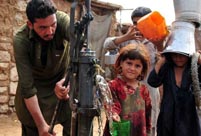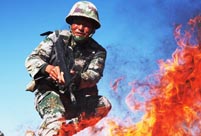Russian President Vladimir Putin's bold initiative offers some hope for diplomatic settlement of the complex and dangerous Syrian issue. But the ball is in Washington's court and the issue is whether it will honestly pursue peace or whether it will deceive the world once again as it did in Iraq and Libya.
The Obama administration's bellicose and incompetent Middle East policy has not only fomented terrorism and instability in the Middle East, but also has raised grave concerns in the US public. The Americans reject more war and are angry at the pro-war politicians slavishly following a pro-Israel line.
The Russian proposal temporarily helps stave off a US attack against Syria. Clearly, President Barack Obama faces a massive shift in Congress and does not have the votes to go to war at this time.
Should Obama order an attack on Syria without congressional authorization he could face impeachment. A bill of impeachment is reportedly already drafted and there are many members of Congress who would join to put it before the House of Representatives.
The "civil war" in Syria is by no means a real civil war. It is a vast proxy war directed not only against the government of Syria but also against its ally Iran. The US and NATO as well as Saudi Arabia, Turkey, and Qatar have made no secret of their common objectives.
According to some estimates, there are over 60,000 foreign fighters inside Syria against the people and government of the country. They are funded by Saudi Arabia, Turkey, and Qatar.
As is well known, the bulk of the forces operating inside Syria have direct and indirect links with Al Qaeda and similar terrorist networks.
The chaos caused by the terrorists inside Syria has resulted in a massive refugee situation spilling over into neighboring countries. Some say there are already over 1 million Syrian refugees, Muslim and Christian, in Lebanon alone.
The Putin initiative is aimed at the immediate issue of weapons of mass destruction but also recognizes that solving this problem can lead to broader peace negotiations.
Because of the massive loss of US prestige and trust in the region over the past decade, Washington's credibility has eroded not only with the common man in the street but also with some regional leaders.
On the other hand, Russia's concern for peace and stability in the region offers new options. Moscow's star may be rising somewhat as Washington's star falls precipitously.
It is not clear just how the present crisis in Syria can be solved. The Assad government is taking steps to join international efforts to eliminate chemical weapons. While this is positive, it is a slow process to inventory, verify, and destroy stockpiles.
But even if this aspect is solved, the question is: What about the terrorist war? How are the tens of thousands of foreign terrorists going to be stopped from their murderous activity?
They do not care about Western-style "democracy," because they insist on a transnational Islamic theocratic regional entity. They could care less about Western-style borders because they think in pan-Islamic terms.
Related to the terrorist war is the question of elections in Syria. US policy toward Syria was declared by Obama himself two years ago to be regime change. This objective has not been disavowed.
National elections in Syria are scheduled for 2014. How can normal elections take place in a situation of terrorism and instability fomented by the West and its Islamic regional allies?
Adding to all of the uncertainty, in Washington pointed questions have now been raised about a potential "false flag" incident launched by Israel to drag the US into military operations and scuttle any peaceful resolution.
So while Putin's initiative is timely and constructive, the track record of the US and Israel in the region does not suggest any easy or quick solutions to the present crisis.
The author is an educator and former senior professional staff member of the US Senate Committee on Foreign Relations. opinion@globaltimes.com.cn
 Pakistan suffers desperate shortage of water
Pakistan suffers desperate shortage of water Lanzhou MAC conducts actual-troop live-ammunition drill
Lanzhou MAC conducts actual-troop live-ammunition drill Heritage train ride across western Kosovo
Heritage train ride across western Kosovo Heavy rain hits Hangzhou, causing traffic jam
Heavy rain hits Hangzhou, causing traffic jam Students wade through water to school
Students wade through water to school Dabaiyi wedding ceremony in China's Yunnan
Dabaiyi wedding ceremony in China's Yunnan Harbin named Chinese city with most beautiful women
Harbin named Chinese city with most beautiful women Weekly Sports Photos: Bale transfers to Real Madrid
Weekly Sports Photos: Bale transfers to Real Madrid Funniest photos of sport stars as kids
Funniest photos of sport stars as kids  Residences of the royal house of Savoy
Residences of the royal house of Savoy China's frigate 'Bengbu'in fire training
China's frigate 'Bengbu'in fire training The last days of Wan Aihua
The last days of Wan Aihua Highlights at 12th National Games of China
Highlights at 12th National Games of China Beijing Film Academy welcomes freshmen
Beijing Film Academy welcomes freshmen 2013 Taiwan Int'l Tourism Expo kicks off in Taipei
2013 Taiwan Int'l Tourism Expo kicks off in TaipeiDay|Week|Month